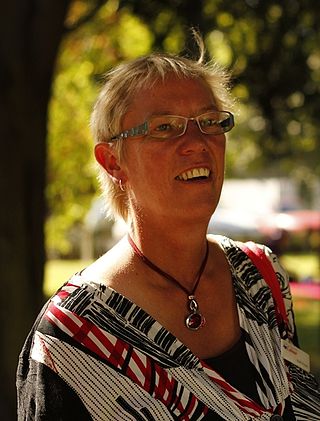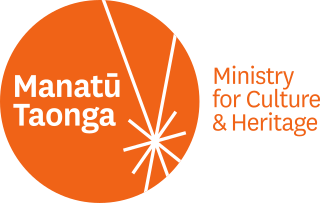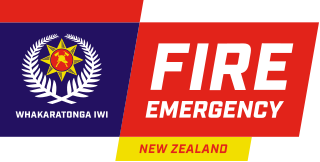Related Research Articles

The Department of Conservation is the public service department of New Zealand charged with the conservation of New Zealand's natural and historical heritage.
Fire police are fire department members who, based upon their jurisdictional authority, receive sworn police powers, special training, and support firefighting efforts at emergency incidents. In addition to securing firefighting equipment, incident and fire scenes, and the station itself, fire police perform traffic and crowd control. In some jurisdictions, fire police are exterior firefighters and may be called upon at fire scenes to perform any of the duties of an interior firefighter except those that require a self-contained breathing apparatus. On occasion, fire police also assist regular police: they perform road closures, traffic control, crowd control at public events, missing persons searches, parade details, salvage, security, and other miscellaneous tasks as requested.

Sir David Cunningham Carter is a New Zealand National Party politician who served as the 29th Speaker of the New Zealand House of Representatives from 2013 to 2017 and as a Cabinet Minister in the Fourth and Fifth National Governments. He represented the Selwyn electorate in the 44th Parliament and the Banks Peninsula electorate in the 45th Parliament. He served as a list MP from 1999 until he retired at the 2020 election.

Ruth Suzanne Dyson is a former New Zealand politician. She was a Labour Party Member of Parliament from 1993 to 2020. She represented the Port Hills electorate from the 2008 election election to 2020. She also held a number of senior offices in the Labour Party, including president.

The New South Wales Rural Fire Service is a volunteer-based firefighting agency and statutory body of the Government of New South Wales.

Compulsory military training (CMT), a form of conscription, was practised for males in New Zealand between 1909 and 1972. Military training in New Zealand has been voluntary before then and ever since.
Consumer NZ, previously known as Consumers' Institute of New Zealand, is an organization that covers a wide range of activities relating to consumer protection and information. Its work includes comparative tests and surveys of consumer goods and services, research into and advice on financial, food, health, safety, welfare and environmental matters, representation at parliamentary committees and public enquiries and interest in consumer education and complaints advisory work.
The New Zealand Fire Service was New Zealand's main firefighting body from 1 April 1976 until 1 July 2017 – at which point it was dissolved and incorporated into the new Fire and Emergency New Zealand.

The Accident Compensation Corporation (ACC) is the New Zealand Crown entity responsible for administering the country's no-fault accidental injury compensation scheme, commonly referred to as the ACC scheme. The scheme provides financial compensation and support to citizens, residents, and temporary visitors who have suffered personal injuries.
Minimum wage law is the body of law which prohibits employers from hiring employees or workers for less than a given hourly, daily or monthly minimum wage. More than 90% of all countries have some kind of minimum wage legislation.

The Ministry for Culture and Heritage is the department of the New Zealand Government responsible for supporting the arts, culture, built heritage, sport and recreation, and broadcasting sectors in New Zealand and advising government on such.
The Social Policy Research and Evaluation Unit, known as Superu and previously known as the Families Commission, was an autonomous New Zealand Crown entity which undertook social science research and advocated to government on behalf of families. It commenced operating on 1 July 2004 and was disestablished on 30 June 2018.

Kristopher John Faafoi is a former New Zealand Labour Party politician. He became the Member of Parliament for the Mana electorate in 2010. He did not contest the seat as an electorate MP in 2020 but continued as a list MP. He held a number of ministerial portfolios in the Sixth Labour Government from 2017, until he announced his retirement from politics in June 2022.

New Zealand has a unitary system of government in which the authority of the central government defines sub-national entities. Local government in New Zealand has only the powers conferred upon it by the New Zealand Parliament. Under the Local Government Act 2002, local authorities are responsible for enabling democratic local decision-making and promoting the social, economic, environmental, and cultural well-being of their communities, as well as more specific functions for which they have delegated authority.

1Law4All was a registered political party in New Zealand. The party was launched in June 2013 and was temporarily led by Tom Johnson. The party supported removing references to the Treaty of Waitangi from legislation, abolition of the Waitangi Tribunal and Māori electorates, repeal of the Marine and Coastal Area Act 2011, and withdrawal of New Zealand from the UN Declaration on the Rights of Indigenous Peoples. The party never contested an election and was deregistered in May 2015.
Darroch Leicester Ball is a New Zealand politician of the New Zealand First party.

Fire and Emergency New Zealand is New Zealand's main firefighting and emergency services body.

The Canterbury District Health Board was a district health board with the focus on providing healthcare to the Canterbury region of New Zealand, north of the Rangitata River. It was responsible for roughly 579,000 residents, or 12% of New Zealand's population. The Canterbury District Health Board covered a territory of 26,881 square kilometers and was divided between six territorial local authorities. In July 2022, the Canterbury DHB was merged into the national health service Te Whatu Ora.

The Real Estate Authority (REA), formerly the Real Estate Agents Authority (REAA), is the New Zealand Crown entity responsible for the regulation of the New Zealand real estate industry as well as the agents within it.
Health New Zealand - Te Whatu Ora is the primary publicly funded healthcare system of New Zealand. It was established by the New Zealand Government to replace the country's 20 district health boards (DHBs) on 1 July 2022. Te Whatu Ora is charged with working alongside the Public Health Agency and Te Aka Whai Ora to manage the provision of healthcare services in New Zealand. Margie Apa was appointed chief executive of Te Whatu Ora in December 2021.
References
- ↑ Fire Service Act 1975 (repealed) (42). 19 September 1975. Retrieved 30 July 2013.
- ↑ Fire Service Act 1975 (repealed) (42, 6). 19 September 1975. Retrieved 30 July 2013.
- ↑ "The Board". fire.org.nz. Retrieved 5 September 2016.
- ↑ "Our Structure". fireandemergency.nz. Retrieved 11 August 2017.